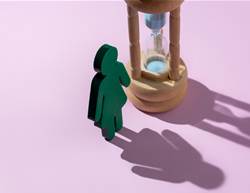Hot flushes, mood swings, and night sweats are commonly associated with menopause and perimenopause—but hair loss? That’s one symptom many don’t see coming. And when it does, it can be emotionally devastating.
Why Perimenopausal Hair Loss Happens
Hair thinning or loss during perimenopause is more common than most expect. A 2022 study found that over half of postmenopausal women experience some degree of hair loss. This is largely due to fluctuating hormone levels—particularly declining oestrogen and progesterone, which influence the hair growth cycle.
These hormonal changes can shrink hair follicles, slow regrowth, and cause more hair to shed than usual. For many women, this can feel deeply personal. Hair is tied to identity, and sudden changes can trigger anxiety or sadness.
It’s Not Just Hair Loss
Perimenopause doesn’t come with a neat checklist—it often arrives with a wave of unexpected symptoms. Common ones include:
- Hot flushes and night sweats, sometimes occurring unpredictably throughout the day
- Mood changes, including irritability, sadness, or emotional volatility
- Brain fog or forgetfulness
- Anxiety that can feel intense or even paralysing
- Sudden weight gain, often without any changes in diet or exercise
These symptoms can overlap with mental health challenges, leaving some women feeling disconnected, misunderstood, or even ashamed.
The Link Between Perimenopause and Mental Health
It’s not uncommon for women experiencing hormonal shifts to also face mental health challenges. Feelings of defectiveness or withdrawal can build up, especially if symptoms are brushed off or mislabelled as “just moodiness” or “getting older”.
The risk of isolation is real. When emotional symptoms worsen and go unnoticed by those around us, they can spiral into more serious struggles. That’s why support—both professional and social—is critical.
What Helps: A Focus on Food and Support
Managing symptoms often requires a combination of strategies. Hormone specialists frequently recommend an anti-inflammatory diet, which may help reduce severity. This includes:
- Limiting gluten, dairy, caffeine, and alcohol
- Focusing on whole foods, leafy greens, and healthy fats
- Staying hydrated and prioritising sleep
It’s not always easy—especially when cravings strike—but many women report feeling noticeably better after making dietary changes. A few slip-ups are normal; what matters is finding a rhythm that supports your body through change.
Let’s Talk About It
One of the most powerful tools for navigating perimenopause? Conversation. Talking about symptoms, sharing resources, and building community can help normalise the experience and reduce stigma.
If perimenopause has left you feeling alone or struggling, know that support is available. Speaking to a GP or a women’s health specialist can be the first step toward relief.








